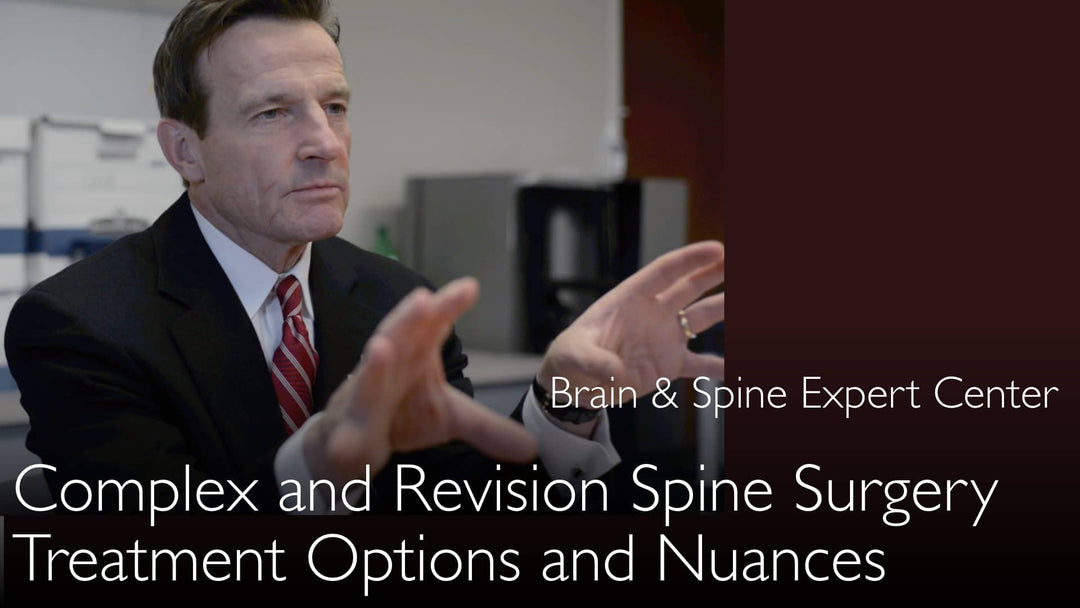Revision spine surgery requires getting a medical second opinion. Revision spine surgery is often more extensive than the first spinal surgery. Surgeon has to weigh indication for revision spine surgery very carefully. Leading Boston-based spine surgeon shares his method to evaluation of patients for revision spine surgery, failed lumbar fusion and complex instrumentation. Revision spine surgery medical second opinion. In 25% of cases spinal fusion revision surgery is required within ten years after a lumbar fusion. It is due to the ongoing degenerative changes in the lumbar spine. Video interview with leading expert in spine surgery. Revision spine surgery medical second opinion helps patients avoid unnecessary surgical operations. Advice on revision surgery for failed fusion has to be tailored to specific patient situation. Medical second opinion clarifies the failed lumbar fusion diagnosis. Medical second opinion also helps to choose the best treatment for complex spine surgery and spinal fusion revision. Seek medical second opinion on lumbar revision surgery and be confident that your treatment is the best. There is a brighter outlook on spinal revision surgery and complex spine hardware revisions today. How long does a spinal fusion last? Dr. Anton Titov, MD. Approximately 10 years as the spine continues to age. Revision spine surgery medical second opinion can only be provided by experienced senior spine surgeon. Complications of revision spinal surgery include failed fusion . This requires repeat surgical operation. Indications for complex revision surgery are progressive weakness, bowel and bladder dysfunction or failure of conservative therapy. Surgeon has additional considerations in revision spine surgery, because a lot of scar tissue is present. It is very important to put more curve into the lumbar spine. Surgeons learned that balance of the torso over the pelvis is crucial factor in preventing revision spine surgery. Revision spine surgery medical second opinion makes treatment decisions easier and better. Revision spine surgery medical second opinion. Dr. Anton Titov, MD. Dr. Anton Titov, MD. You perform a lot of the complex spine surgery. Frequently this involves multiple revisions and a lot of hardware placement. Could you please give some examples of the complex spine surgery that you do in your practice? Dr. Anton Titov, MD. How patients should method the situation of complex and revision spinal surgery? Dr. Anton Titov, MD. Dr. Eric Woodard, MD. Spine neurosurgeon, Boston. Sure. Spine surgery in general has a bit of a negative reputation as requiring more surgery. the reasons for that are numerous. But one of the reasons that is under-appreciated is this fact. With the aging process the spine continues to age, continues to change. even if one section of the spine is treated appropriately, other sections continue to age. They continue to break down. not infrequently, perhaps even as high as 20% to 25% of the time, within ten years after a lumbar fusion there will be a requirement for additional treatment. It is due to the ongoing changes, age related changes in the lumbar spine. the revision spine surgery is a bit more difficult than initial spine surgery. Because scar is present. because of the presence of perhaps even prior fusion mass or prior instrumentation that has to be removed. The scar needs to be dissected from the very delicate neural structures. revision spine surgery is a bit of a different endeavor than the first time around [than first spine surgery]. That is what makes revision spine surgery technically a bit more of a challenge from a surgeon's perspective. The indications to do complex revision spine surgery obviously are similar to the initial indications for spine surgery. Indications are progressive weakness, bowel and bladder problems or failure of conservative therapy. Dr. Eric Woodard, MD. But as Dr. Eric Woodard, MD. I said, from a technical surgery standpoint, Dr. Eric Woodard, MD. I have certain additional considerations in revision spine surgery, mainly due to the scar. Increasingly we are seeing a particular disorder that is much more commonly seen in revision back surgery. This disorder happens especially in the elderly. that is flattening up of the lumbar lordosis. Patients tend to progressively come forward patients bend forward. some of that is a normal age-related process, spinal disc settling. some of flattening of lumbar lordosis is due to surgery being limited. Other reason is when the surgery not adequately restoring what we call sagittal balance. Sagittal balance is a nice balance upright posture. increasingly with revision spine surgery we are having to put more curve into the lumbar spine. Dr. Eric Woodard, MD. We do this via a number of techniques. Sometimes the spine has to be broken in certain areas to reposition spine in a balanced position. increasingly in the last 10 years we have learned that balance of the torso over the pelvis is probably the most important element in preventing revision spine surgery. Revision spine surgery medical second opinion. Video interview with leading expert in spine surgery. How often complications develop? Dr. Anton Titov, MD. How to treat failed spine fusion?
More from Diagnostic Detectives Network
You may also like
Recently viewed




